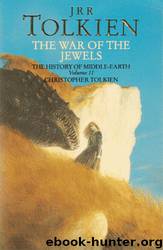The War of the Jewels by J.R.R. Tolkien

Author:J.R.R. Tolkien [Tolkien, J.R.R.]
Language: eng
Format: epub
Published: 0100-12-31T16:00:00+00:00
Tale of the Nauglafring there were the two peoples, the Dwarves of
Nogrod and the Dwarves of Belegost, and the latter were the
Indrafangs or Longbeards; in the Quenta the same was true (or at
least, no other peoples were mentioned), although the Longbeards
had become the Dwarves of Nogrod (IV.104), and this remained the
case in QS ($124).
In the present text two things are said on the subject. Durin was
'the father of that Dwarf-kin ... whose mansions were at Khazad-
dum' ($3); but (reverting to the Tale of the Nauglafring) the
Longbeards were the Dwarves of Belegost ($7) - and this is said also
both in the Annals of Aman and in the Grey Annals (see p. 108, $22).
I am not altogether certain how to interpret this; but the simplest
solution is to suppose that when my father wrote these texts he had
forgotten Thorin's mention of Durin as the ancestor of the Long-
beards in The Hobbit (or, less probably, that he consciously dis-
regarded it), and the following considerations support it.
At the beginning of the section Durin's Folk in Appendix A (III) to
The Lord of the Rings the reading of the First Edition was: 'Durin is
the name that the Dwarves use for the eldest of the Seven Fathers of
all their race', without mention of the Longbeards. Years later, on
his copy of the second edition of The Hobbit, my father noted: 'Not
so in Silmarillion nor see [sic] LR III p. 352' - this being a reference
to the passage just cited from Appendix A in the First Edition: what
was 'not so' was Thorin's reference to 'one of the two races of
dwarves', become obsolete since the emergence of the conception of
the Seven Fathers. At the same time he wrote on this copy many
tentative phrases to replace Thorin's original words, such as 'the
eldest of the Seven Fathers of the Dwarves', 'the father of the fathers
of the eldest line of the Dwarf-kings, the Longbeards', before
arriving at the final form as subsequently published, 'He was the
father of the fathers of the eldest race of Dwarves, the Longbeards,
and my first ancestor: I am his heir.' It was obviously considera-
tion of Thorin's words in The Hobbit and the need for their
correction that led him to alter the text of Appendix A, which in the
Second Edition (1966) reads: 'Durin is the name that the Dwarves
used for the eldest of the Seven Fathers of their race, and the
ancestor of all the kings of the Longbeards', with the addition of a
footnote reference to the passage in The Hobbit, now published in
its corrected form.
Thus, circuitously, the Longbeards finally entered The Lord of the
Rings, as the Dwarves of Khazad-dum; but the texts of The
Silmarillion and the Annals were never changed, and the Long-
beards remained the Dwarves of Belegost.
$6. The marginal note 'Thus the Lammas' apparently refers speci-
fically to the statement in the text concerning the kinship of
languages of the Easterlings with Dwarf-speech. Cf. V.179 (Lham-
mas $9): 'the languages of Men are derived in part from them' (the
tongues of the Dwarves); this was repeated in the footnote to QS
$123, from which the present paragraph was developed, and which
also has a marginal note 'So, the Lhammas'.
Download
This site does not store any files on its server. We only index and link to content provided by other sites. Please contact the content providers to delete copyright contents if any and email us, we'll remove relevant links or contents immediately.
Sita - Warrior of Mithila (Book 2 of the Ram Chandra Series) by Amish(53874)
Crystal Cove by Lisa Kleypas(38503)
The Crystal Crypt by Dick Philip K(36463)
The Crystal Egg by Wells H.G(35441)
We Ride Upon Sticks by Quan Barry(34034)
Crowbone (The Oathsworn Series, Book 5) by Low Robert(33087)
Primed Son (Dark Siren Book 4) by Eden Ashley(18811)
The Secret History by Donna Tartt(18236)
Cat's cradle by Kurt Vonnegut(14785)
Always and Forever, Lara Jean by Jenny Han(14498)
Ready Player One by Cline Ernest(14036)
Norse Mythology by Gaiman Neil(12867)
Crooked Kingdom: Book 2 (Six of Crows) by Bardugo Leigh(11984)
4 3 2 1: A Novel by Paul Auster(11823)
The Betrayed by Igor Ljubuncic(11638)
The Betrayed by Matthew Dickerson(11441)
Scorched by Sharon Ashwood(11181)
The Betrayed: Book one of The Lost Words by Ljubuncic Igor(11151)
Scorched Treachery (Imdalind #3) by Ethington Rebecca(11031)
